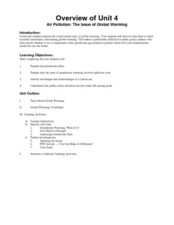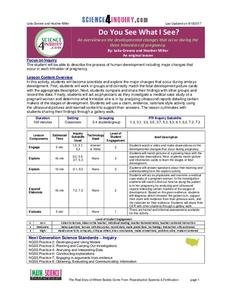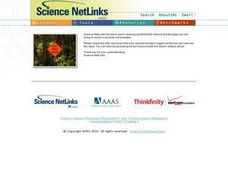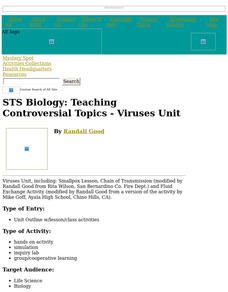Curated OER
Air Pollution: The Issue of Global Warming
Here is an outstanding 10-page lesson plan on global warming. Learners discover that there is a lot of controversy surrounding this topic in that the science behind global warming is difficult to prove. The best thing about this plan is...
Curated OER
once and future MOON
Beyond the phases of the moon, this comprehensive lesson plan covers geologic history and geology. Amateur astronauts examine photos of the lunar landscape, experiment with the creation of craters, and delve into information about the...
Curated OER
Tutti Frutti
Get some competition going in your life science class. Give lab groups a variety of plant parts, all of them fruits, except one. Their mission is to make observations, compare and contrast, in order to be the first to identify the...
Curated OER
Comparison of Protein Sequences From Two Samples of Crabmeat Using Gel Electrophoresis As an Introduction To the Biotechnology Lab
Students discover that proteins that are the product of DNA translation are different for different species. They determine that by analyzing their mass and charge they can differentiate between two different species. They use some of...
TED-Ed
Tycho Brahe, the Scandalous Astronomer
Who says scientists are boring geeks? Certainly not the narrator of a short video who dishes up the scandals associated with Tycho Brahe, a Danish scientist and alchemist (now that's two labels you don't often see together) who used...
TED-Ed
The Colossal Consequences of Supervolcanoes
The threat posed by super volcanoes is explored in a short video that reviews the destruction caused by Mount Tambora in 1815 and by Peru's Huaynaputina in 1600. Think it can't happen again? The narrator contends that the explosive...
Howard Hughes Medical Institute
How Novel Icefish Genes Can Improve Human Health
Designed to accompany the 13-minute video The Making of the Fittest: The Birth and Death of Genes, this handout serves as both a viewing guide during the video and an analysis of how the adaptations of the icefish might help treat some...
US Environmental Protection Agency
Carbon Through the Seasons
Meteorologists view an animated video by the Environmental Protection Agency to learn how the carbon cycle works, and then move into groups to analyze and graph actual data of the atmospheric carbon dioxide concentration from Hawaii's...
Global Oneness Project
The Value of Ancient Traditions
Imagine having to give up cell phones, computers, and TV? What would be lost? What gained? An examination of the Drokpa, a nomadic people who live in the grasslands of Tibet, provides class members an opportunity to consider how access...
Science 4 Inquiry
Do You See What I See?
In only nine months, a small group of cells grows into a fully developed baby. Pupils learn about the development of an embryo to a fetus to a baby. They identify each step of weekly development. Young scientists look at ultrasounds to...
Curated OER
The Effect of Natural Selection on Genes, Traits and Individuals
Rotating through five stations, evolutionary biologists explore the question of how changes in DNA facilitate the changes in a population over time. High-quality, colorful cards of animals, skeletons, skulls, and DNA sequences can all be...
TED-Ed
How to Speak Monkey: The Language of Cotton-Top Tamarins
Tamarin monkey language can be categorized by stem upsweep, duration, peak frequency, and frequency change. Although other complex terminology is used to describe the 38 calls of this species, the video is easy to follow and a...
Curated OER
Comparing Theories: Lamarck and Darwin
High schoolers compare the evolution theories of Lamarck and Darwin. They use self-assessment and a video to increase their knowledge of evolution theories. They research questions and present them to the class.
Curated OER
Replacing Missing Links in the Evolutionary Chain
Examine the evolution of various species of hominids from their earliest existence approximately 4.5 million years ago to today. In small groups, learners research one of the ten stages of hominid evolution and then create a poster and...
Safe Drinking Water Foundation
Ask an Engineer
A wrap-up to the unit, young environmentalists discuss and write about the difference in perspectives of a water keeper and water treatment engineer.
Curated OER
Viruses
A fliud exchange activity using pipettes/droppers to exchange fluids with at least 3 people. your learners are advised not to spill any liquid. Droppers are collected in a large beaker, and students return to desks while holding tubes....
Curated OER
Walter Reed's Yellow Fever Studies
Middle schoolers and high schoolers examine the ethics of using human test subjects in scientific research. They do a simulation which focuses on yellow fever and how human subjects were used to develop a treatment/cure for the disease...
Curated OER
Ocean Careers Exploration
Learners will work together in groups to gather information about careers in oceanography. They discover the need to have a diverse group of people on a team and then share their information with the class. Web links and materials are...
Curated OER
Health Conscious?
What is your attitude on health and illness? By considering their own experiences, students will reflect on and discuss their attitudes toward health and illness while educating each other by researching illnesses in small groups,...
Consortium for Ocean Science Exploration and Engagement (COSEE)
Life in an Ocean World
How does the shell color of crabs and the habitat they live in impact the predator-prey relationship? The fourth lesson in a series of five is a game where participants try not to get eaten if they are a prey and try to eat if they are...
Curated OER
Exploring Arizona's Biotic Communities Lesson 3: A Day in the Life
Junior ecologists examine Arizona's biotic communities and research an animal or plant that is found in this community. In this instructional activity, learnerss write a narrative essay about their assigned animal or plant. They research...
NOAA
Marine Ecosystems
Be at the top of the food chain when it comes to understanding marine ecosystems. The 21st installment of a 23-part NOAA Enrichment in Marine sciences and Oceanography (NEMO) program investigates marine ecosystems, ocean zones, and food...
NOAA
Marine Policy
Save the oceans! The 22nd installment of a 23-part NOAA Enrichment in Marine sciences and Oceanography (NEMO) program focuses on laws and marine policy. Pupils take part in an activity investigating fisheries stock data.
Curated OER
Rachel's Life is in a Hole
Explore how lack of access to water impacts peoples' lives in poor countries. Through text reading and discussion, middle schoolers are presented with the story of a young girl who lives and functions with limited water resources. They...
Other popular searches
- Esl Lessons Daily Routine
- Life Skills Lessons Manuals
- Patience Life Skills Lessons
- Life Skills Lessons Respect

























